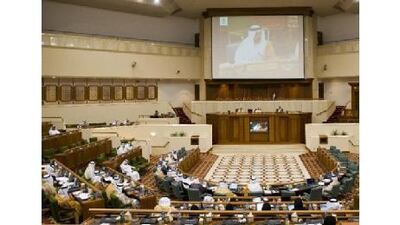ABU DHABI // Fresh from their summer recess, Federal National Council members are calling for a greater legislative role. They also say a clearer election law is needed before February, when the council's current term expires.
Some members said a system that ensures only qualified individuals can be members of the FNC was needed before the body could be entrusted with drafting laws. These members maintain that the UAE's democratic experience is evolving. Others are concerned that their work - sessions resume this month - has limited effect. They say recommendations issued by the council are often not applied by the ministries and agencies that they are supposed to monitor.
Aisha al Roumi, a member from Sharjah, said the council needs to be entrusted with more responsibility, and the Government should draft legislation to empower the chamber. She said government bodies must be required to carry out the recommendations of the FNC, which can review but not initiate legislation. Dr al Roumi, who was elected in 2006, urged the drafting of an election law to govern the process, saying members had no indication yet whether there was any progress on the issue. Elections for FNC seats are expected, but no vote has been scheduled.
The current scheme under which half of the council's members are elected is a good compromise that emulates bicameral parliaments around the world, she said. "We want a bigger role, but there has to be an improvement in the council's performance," said Dr Sultan al Muezzin, a member from Fujairah and the head of the health, labour and social affairs committee. "Everyone blows the horn of wanting a legislative role, but without the capability and exceptional minds, we cannot," he said.
Dr al Muezzin advocates that FNC members, at a minimum, have a university degree. "The council is right now, with the current group, unqualified to draft legislation," he said. Half of the FNC's 40 members are appointed, and the other half are voted for by a caucus of nearly 7,000 Emiratis. Dr al Muezzin said the chamber should have greater oversight powers, including an expanded ability to question ministers and government bodies, and to follow up recommendations.
He said, the number of members needs to increase, as committees are currently burdened with oversight of multiple ministries. But election reform is necessary too, Dr al Muezzin said. "It is definitely late - four months are not enough," he said. "Until today there is no election law in the UAE. There has to be an election law." The FNC carried out its first elections in 2006. Its term was initially supposed to expire in 2008, but the Constitution was amended to increase the term to four years.
"The UAE took an exceptional step that was granted by the government and was not taken away," he said. "It was a great step for the UAE in the direction of democracy." People need a broadened "election culture", he said. A lot of Emiratis cannot be bothered to ponder elections because they are guaranteed health care, education, housing and employment, he said. Ali al Matroushi, a member from Ajman and the head of the defence and home affairs committee, said he was satisfied with the current powers of the FNC. Most laws are reviewed by the council, and recommendations are delivered to the Cabinet.
Mr al Matroushi did not speculate about the elections, saying he was confident the Government had a plan for the council. "Development takes time," he said. Ahmed al Dhaheri, the deputy head of the FNC and a member from Abu Dhabi, said election policy is controlled by higher government authorities and should be left to those authorities.


